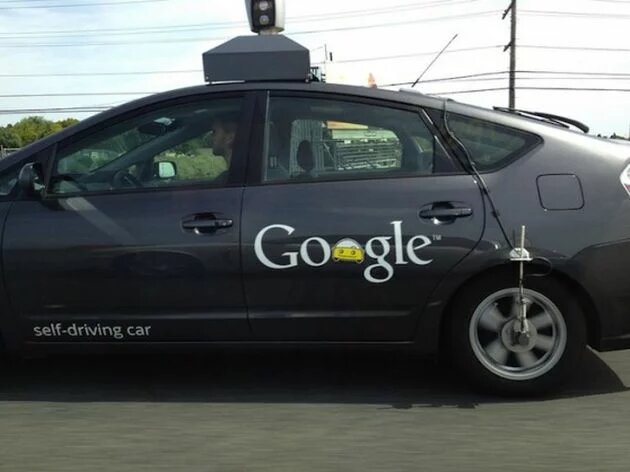
A few days ago Google hit the headlines when it unveiled a prototype self-driving car with no steering wheel and no accelerator or brake pedals. While we here in Germany complain about the opening of bus lanes to electric cars and the feasibility of ambitious exhaust standards, an American Internet company is busy radically rethinking the future of individual and also more environmentally friendly mobility.
Where digitisation moves in, business models and production processes change. Established companies along with their employees often perceive this as a threat. Digitisation brings structural change, but it also creates space for new things, for innovative renewal. No country on earth earns as much from high-end technologies as Germany and no other country has such well-developed domestic production, backed up by strong industry and a firmly established SME sector. Once before we were able to become world leaders in technology within a short space of time with a landmark project, namely the Energiewende or shift to renewable energies. The term, coined in Germany, scarcely needs translating any more in the English-speaking world because it stands for itself. Renewable energies and efficiency technologies “made and designed in Germany”.
But what does our Economics Minister do? Writing in the Frankfurter Allgemeine Zeitung on 16 May 2014, Sigmar Gabriel fights a rearguard action in the role of patron saint of Germany plc. The threat to break up Google is easily exposed as such. There is of course a systematic conflict of interest if the market dominant search engine is at the same time offering the services searched for. This, however, is a case for the competition authorities, although it is true that these lack an efficient instrument with which to combat excessive market power. Pursuing a course of action driven by fear, as in the case of Google, will not save any jobs in Germany. Much worse than that, it will prevent new jobs being created in areas where our strengths lie.
For Germany as a business location digitisation will enable massive productivity leaps of 50% or more in the factories of the future. The same applies to the saving of resources and fossil fuels. Not only will companies see their competitiveness increase, climate protection, too, will benefit. It is almost impossible to envisage how much Europe and in particular Germany could achieve in terms of global competitive advantages if we make the digital transformation an environmental transformation too. From intelligent infrastructures and app-controlled mobility concepts through to zero emission factories and the potential of the sharing economy – why should that not work in Germany too? To apply intelligent solutions to make Germany the green workbench for the world: that would be a worthwhile vision to guide SMEs and industry!
Politics has a responsibility here, but so too does the whole of industry. To return to the example at the beginning, why in Germany, the land of the car, is there no “mobility valley” where home-grown start-ups develop the mobility concepts of the future? Would in not make sense for Daimler, BMW and VW, together with SAP, to come up with the money to create an incubator for innovation, supported by public research projects and funding?
For this we need a change of mindset among managers and politicians. How can we continue to improve what we already have while at the same time completely rethinking things? How can we get industry and software developers to join their thinking together better? And how can we carry the SME sector, the backbone of the German economy, with us? This is where the thinkers and inventive minds are and we need their knowhow now more than ever. Pursuing these questions is what any economics minister should be doing and is certainly more constructive than talking about breaking up companies.
The policymakers have another central task: they have to create confidence. Effective data protection is a central factor in terms of location. After the recent wire-tapping scandals companies are rightly sceptical about technological innovations. SMEs in particular have fears about data security and economic espionage. Here the Federal Government must shoulder some of the blame. It is a terrible thing to watch the Federal Chancellor and the German judiciary standing helplessly by as the NSA, in clear contravention of the law, mine our data and eavesdrop on our telephone calls and we do not even have the courage to invite Snowden to Germany.
Instead of behaving like a rabbit mesmerised by a snake, fearing that software will gobble up the hardware, we should reflect on our strengths. We as a prime business location have an opportunity to harness the potential created by digital change for the benefit of our traditional industries. We sink 1.5 billion euro, or 22 per cent of the economics budget, into coal subsidies, in other words into obsolete structures, while we set aside a feeble 67 million euro for promoting information and communication technologies. And with the nuclear industry’s attempt to offload the old nuclear power stations on taxpayers, the next black hole into which billions will disappear looms near. Or we could do something for the future and spend 1.5 billion euro on a digital infrastructure policy fit for the future. Giving priority to an education and training package to promote interdisciplinary lateral thinking: that really would be a new industry policy. What is at stake here is nothing less than the future viability of Germany as an economic location.
This article was originally published in German in the Frankfurter Allgemeine Zeitung on August 12, 2014. The english version was first published here.